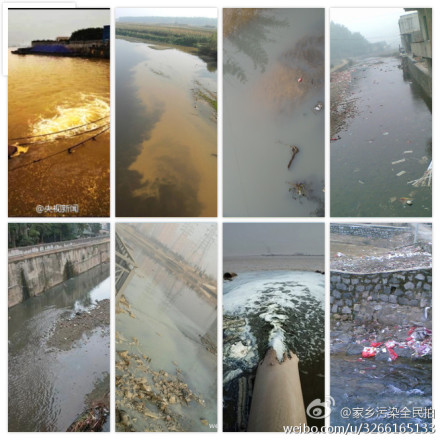As the effects of China’s toxic smog problem in mid-January continue to reverberate throughout the country, severe water pollution has recently been brought to light by online campaigns calling for a reality check on the state of rivers across the nation.
Leading the campaign is Deng Fei (@邓飞), a former investigative journalist and now a prominent social activist, who invited people [zh] to snap photos of rivers and post them on the microblogging service Weibo.
#你家河流还好吗?#过年在家,请拍下你家乡的那条河流,然后上传微博,让我们看见。
#How is the river in your hometown?# While celebrating Chinese New Year at home, please take a photo of the river and upload it to Weibo for us to see.
His call touched a nerve and many went online to voice their anger over polluted rivers. Photos posted by netizens show waste and litter scattered along river banks.

A collection of microbloggers’ photos of river pollution near their hometowns by Snapshot of Pollution (@家乡污染全民拍).
According to the Chinese Ministry of Supervision, over 1,700 water pollution incidents are estimated to occur every year. The World Bank, in a 2007 report titled The Cost of Pollution in China, labeled water pollution a “significant problem” in China’s rural areas, putting the number of premature deaths caused by water and air pollution at 750,000 per year.
Describing the pollution, @xiaotaiyang1988 (@土豆_连种带挖) said:
#回家看河#家里这条护城河已经由臭变成非常臭由脏变成非常脏了。县西引进了二化工程,连我上初中的弟弟都说,那是在市里赶来赶去没办法开在我们县了,因为好不容易招商引资来个项目,浓烟直冒。河两边的住户生活废水全都直接入河,前几年还听说在治理,现在破罐子破摔了。@邓飞
#Coming home to check the river# The city moat in my hometown has turned from smelly and dirty to very smelly and very dirty. A chemical factory has been introduced in the west of the county, and even my little brother in middle school said the project was introduced in our county because it couldn’t open in the city and because this project is hard to come by given the difficulty of attracting investment. Dense smoke is being emitted (from the factory). Wastewater from residents on the river bank now directly enters the river, and while people had the willingness to address it a few years back, we have now just abandoned the effort altogether. @DengFei
@FlyOnTheSea (@海阔依飞) wrote sarcastically:
#你家河流还好吗# 那是个不能靠近的禁区………
#How is the river in your hometown# That [the river] is a restricted zone you can’t get close to……
Some Chinese media have also joined the crusade against water pollution. The Beijing News (@新京报), a paper known for its hard-hitting journalism, presented [zh] a horrific picture on its official Weibo account:
中国地质调查局专家称,全国90%的地下水遭受了不同程度的污染,其中60%污染严重。据新华网报道,有关部门对118个城市连续监测数据显示,约有64%的城市地下水遭受严重污染,33%的地下水受到轻度污染,基本清洁的城市地下水只有3%。
According to experts at China Geological Survey, 90% of the underground water has suffered different degrees of contamination, with 60% suffering severe contamination. According to Xinhua News Online, data taken from relevant monitoring departments in 118 cities has shown that about 64% of the underground water in the cities has been severely contaminated, 33% of the underground water has been lightly contaminated, and only 3% of the underground water in the cities is considered moderately clean.
Even the People’s Daily (@人民日报), the official mouthpiece newspaper of the government, has weighed in [zh] and issued a grave warning on its Weibo account:
【微评论:向地下水污染“宣战”】节日的喜庆气氛中,一些地方地下水污染的现实让人揪心。污水注入地下,势必污染水源,残害当代、祸延后世。企业不能为利 润而荼毒苍生,政府部门也不能为政绩而放任纵容。我们不要断子绝孙的GDP,从政府到公众,都应吹响治理水污染的集结号,为美丽中国蓄积纯净水源。
【Micro-comment: “Declare War” on underground water pollution】Amid the holiday atmosphere, the reality of underground water pollution has made people anxious. Disposing of wastewater underground will inevitably contaminate water resources, harm our generation, and pass along the damage to the next. Enterprises shouldn’t poison the public to chase higher profits, government agencies shouldn’t loosen their regulations for the sake of their work performance. We want a GDP that won't kill the next generation, and from the government to the public, we should all trumpet the cause of water pollution control and preserve clean water sources for a beautiful China.
As the chatter in the cyberspace heats up and draws more media attention, there are indications that efforts to expose the extent of water pollution have taken a turn. Laywer Gang Yuanchun (@甘元春律师 ) posted a message on his Weibo account:
:【地下水污染曝光与封杀今夜决战,记者被困,求声援】据@邓飞 和@冯永锋消息:山东淮坊一方面派员进京,试图疏通某部门下发封口令,阻止媒体曝光该地区水污染问题,央视已经做好的片子已被潍坊成功封杀了。另一方面:记者仍旧在潍坊被40多人软禁中。
【 Exposure of underground water pollution and block of tonight’s battle, journalists being held, support needed】According to @DengFei and @FengYongFeng: When the city of Weifang in Shandong province sent people to Beijing to talk to a “certain department” to exercise censorship to prevent media’s exposure of the region’s water pollution problem, CCTV’s finished news was successfully blocked by Weifang. Meanwhile, journalists in Weifang remain under house arrest, detained by some 40 people.
The message was later deleted, pointing to the sensitivity of the issue.
Environmental degradation remains as much a grave public concern as a challenge for China's ruling party. China’s obsession with fast economic growth over the past decade has taken a heavy toll on its environment, enraging a public that is not content with only materialistic benefits.
On July 28, 2012, thousands of people took to the street and stormed a local government office in Qidong, a city in China’s coastal Jiangsu province, over worries of water contamination by a nearby paper factory. And in January of this year, Global Voices reported on residents in the city of Handan who drank and bathed in toxic water when left uninformed by the government about water contamination.
The balancing act between boosting a slowing economy through industrial output and possible social unrests triggered by public health crisis presents a daunting political calculus for China's authorities.







16 comments